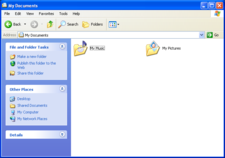- My Documents
-
On Microsoft Windows computer operating systems (except for Windows NT), My Documents is the name of a special folder on the computer's hard drive that the system commonly uses to store a user's documents, music, pictures, downloads, and other files.
Contents
Overview
Microsoft first introduced the "My Documents" folder in Windows 95 OEM Service Release 2, as a standard location for storing user-created files. The folder—located under the root of the hard drive that Windows is installed on—is displayed (but not stored) directly on the user's desktop.
In Windows 2000, Windows XP and Windows Server 2003 set up the "My Documents" folder (by default) in the user's profile directory, as \Documents and Settings\[user name]\My Documents\ (alias %USERPROFILE%\My Documents\) on the same hard drive that Windows is installed on. Note that "My Documents" in these operating systems is one of a number of Special Folders - a concept introduced in Windows 2000 to add a layer of abstraction between the user interface's presentation of the folder and its physical location and contents. As such, "My Documents" in file load/save dialogs (and in Windows Explorer) doesn't appear as an absolute path. A user can change the physical location of "My Documents" by right-clicking on the "My Documents" icon, selecting the
Propertiesoption, and entering a new folder location (path) in theTargettab.Windows Vista renames "My Documents" as, simply, "Documents". "My Music", "My Pictures" and "My Videos" have also lost their prefix, and have moved to directly under the user's profile directory (C:\Users\[user name]\ alias %USERPROFILE%\).
As of Windows 7, The "Documents", "Pictures", "Music" and "Videos" folders appear displayed in Windows Explorer with a "My" prefix but are actually still stored in the file system without the prefix (as in Windows Vista). This raises the question whether Explorer will prevent you from creating a new folder named "My Documents" or if it will prevent you from creating "Documents" because of a name collision. The answer is that in both cases, Explorer assumes you are creating "My Documents" and will prompt for a user intervention.
An application can convert environment strings in a user-supplied path (e.g. "%USERPROFILE%\My Documents\") to an actual path by (for example) calling the function ExpandEnvironmentStrings. In .Net, use System.Environment.ExpandEnvironmentVariables.
Other "My" folders
Windows 98 introduced two additional special folders with a "My" prefix: "My Music" and "My Pictures". In Windows XP, as with "My Documents", these folders can be pointed elsewhere by using Microsoft's TweakUI utility.
"My Music" and "My Pictures" are not present in Windows Server 2003 by default unless enabled using the start-menu customization.
Installing Windows Media Player 10 or 11 on Windows XP adds a "My Videos" folder which Windows Media Player uses to store video files that are shown in its media library.
Many other applications have adopted the "My" naming convention when placing folders in the user's "My Documents" directory:
- Windows Messenger and Windows Live Messenger create a "My Received Files" folder when used for the first time.
- As of 2010[update] "My " (or "Saved Games" since Windows Vista) is becoming an increasingly common place for games (especially those published by Microsoft Game Studios) to store a player's saved game and settings files. This practice aims to make it easier for users to keep their saved games if they uninstall a game, and if they eventually migrate their files to a newer computer (using the Files and Settings Transfer Wizard, for example). For networks with a shared "My Documents" [see Group Policy below], computers that have copies of the same game installed often can not run the same game at the same time. Microsoft's TweakUI does not include the ability to re-path the "My Games" folder.
Additionally, Windows XP and higher may add a prefix to "My Documents" et al. (for example, "My Music", "My Photos). The prefix is generally the user id of the owner for the particular folder at the time the folder was created. The value of the prefix is controlled by undocumented section in the desktop.ini file which stored in the former folder and has the following structure:
[DeleteOnCopy] Owner=<user id> Personalized=39 PersonalizedName=My Pictures
The functionality of DeleteOnCopy section can be indirectly inferred from Microsoft's support article and from other workaround articles on the web.[1]
Criticism
The use of "My" items on the PC and on some web sites has encountered criticism for various reasons since their introduction. Confusion may occur between the My Documents folder and system folders that are similarly used, such as My Pictures or My Videos.[2]
Many Windows programs keep the My Documents folders as the default saving location.[3] If the user's desired saving location is not the My folder, the user needs to navigate to their desired saving location on each save, as opposed to other programs that store the last working directory in the registry. However, these folders are virtualized at the shell level and can be pointed to different physical file-system directories using tools like TweakUI in Windows XP.[4]
Group Policy
On Windows machines which operate as part of a Windows Server domain, administrators can configure the location of "My Documents" (and other Special Folders) through Group Policy settings. Corporate desktop deployments commonly redirect "My Documents" to a folder on a file server.
References
- MSKB 221837 - Configuration of the My Documents folder
- Redirect My Documents to the home directory based on security group membership
- What happened to My Documents?
Footnotes
- ^ For example: http://www.icpug.org.uk/national/features/060402fe.htm
- ^ Karp, David A. (2003). Windows XP annoyances, O'Reilly Media, Inc. pp. 381.
- ^ Karp, David A. (2003). Windows XP annoyances, O'Reilly Media, Inc. pp. 46.
- ^ Karp, David A. (2003). Windows XP annoyances, O'Reilly Media, Inc. pp. 380.
See also
- Windows Explorer
- Special Folders
- My Briefcase - Occasionally used to store files
- Home directory
- Windows Shell namespace
Categories:- Windows components
- File system directories
Wikimedia Foundation. 2010.

